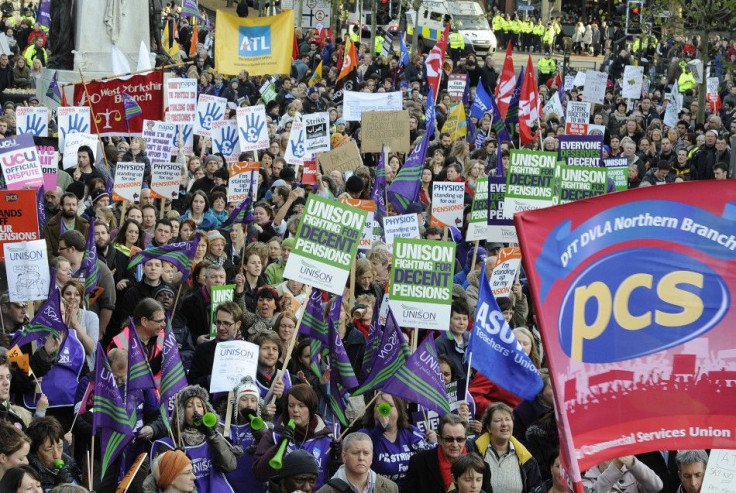Britain Witnesses Biggest Public Sector Strike in 30 Years

Up to two million public sector workers have staged a national strike in the United Kingdom to protest changes in their pension systems in what is believed to be the largest industrial action in Britain since the ‘Winter of Discontent’ of 1979.
The work stoppage has closed or drastically cut down on services provided by schools, seaports, hospitals, airports, ambulance services, courts and government offices.
Along with the industrial action, marches are taking place across the UK, including in London, Birmingham, Leeds, Exeter and Aberdeen.
Essentially, public sector unions object to having their members work longer to earn their pensions, while paying more into the programs themselves.
According to British media reports, almost 60 percent of England’s states schools are closed; while 80 percent in Wales are shut down. However, some schools are reportedly operating with partial staff. In Northern Ireland about half of the schools are closed, while no buses or trains are operating.
Managers of the National Health Service (NHS) estimate that about 6,000 of 30,000 routine medical examinations were cancelled; along with untold thousands of doctor visits and appointments.
However, the strike does not appear to have significantly impacted activity at the two biggest airports, Heathrow and Gatwick, where only a few flights were cancelled.
Scott Stanley, Gatwick's chief operating officer, said in a statement: Whilst passengers have so far not experienced delays at the border zones we do expect delays to occur at some point today as the rate of arriving flights increases.
Moreover, only 16 out of more than 700 job centers were closed, according to government figures.
The Conservative-led coalition government has insisted the pension reforms are necessary to cope with a high deficit, a weakened economic outlook in the country and the fact that people are simply living longer.
British Prime Minister David Cameron has derided the strikes as a damp squib (meaning it will not have the kind of dramatic impact it was originally expected to have).
I don't want to see any strikes, I don't want to see schools closed, I don't want to see problems at our borders, but this government has to make responsible decisions, Cameron said.
Cameron praised the workers who did turn up for work.
In a speech to MPs in the House of Commons, the Prime Minister stated: “I do want to thank all those people, including a number of people from Number 10 Downing Street, who are actually helping to keep our borders open and to make sure Heathrow and Gatwick are working properly. I can report that so far the evidence would suggest that around 40 percent of schools are open, less than a third of the civil service is actually striking. At our borders the early signs are that the contingency measures are minimizing the impact, we have full cover in terms of ambulance services”
Cameron added: “So, despite the disappointment of the party opposite, who support irresponsible and damaging strikes, it looks like something of a damp squib.”
Chancellor of the Exchequer George Osborne, who is attending a Eurozone summit in Brussels, also blasted the strikes,
The strike is not going to achieve anything, it's not going to change anything, he told BBC TV.
It is only going to make our economy weaker and potentially cost jobs. So let's get back round the negotiating table, let's get a pension deal that is fair to the public sector, that gives decent pensions for many, many decades to come but which this county can also afford and our taxpayers can afford. That is what we should be doing today, not seeing these strikes.
Osborne raised the ire of unions on Tuesday when he announced that pay increases for state workers would be capped at 1 percent for two years. He also nearly doubled the number of state jobs that would be slashed over the next five years.
Ed Miliband, the leader of the Labour Party, hedged his reaction to the strike. While he maintained that he has huge sympathy for people who would be inconvenienced by the work stoppage, he added that he will not condemn the dinner ladies, nurses, teachers who have made the decision to go on strike because they feel they have been put in an impossible position by a government that has refused to negotiate properly.
A striking teacher in Hounslow, West London, named Chris Hill, told BBC: It's not a decision we take lightly but we have to take a stand.”
Brendan Barber, the general-secretary of the Trades Union Congress (TUC) union, defended the strike action.
With the scale of change the government are trying to force through, making people work much, much longer and get much, much less, that's the call people have made, he told media.
© Copyright IBTimes 2025. All rights reserved.





















